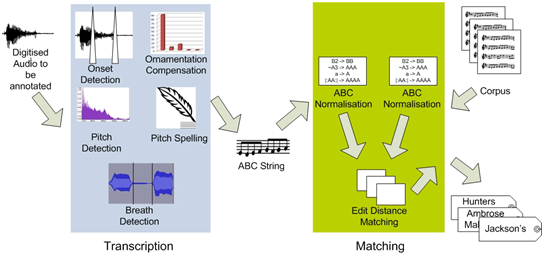Read Karlin Lillington's coverage of Tunepal for iPhone and Android in the Irish Times.
Read Siobhan Long's coverage of tunepal.org in the Irish Times.
Support tunepal.org. Buy my book which explains how it works. Just $15!
Fig 1: High level diagram of MATT2
- tunepal.org requires the latest version of Java to be installed.
- tunepal.org works best with "legato" style instruments such as the tin-whistle, flute, concertina, accordian, pipes, fiddle. It doesnt work very well with "plucked string" instruments such as the banjo and harp.
- tunepal.org currently has a database of over 16,000 tunes from these collections: thesession.org, Henrik Norbeck, O'Neill's 1001, Ceol Rince na hÉireann, Johnny O'Leary of Sliabh Luachra, The Microphone Rambles, John Tose (Welsh Tunes), Jack Campin (Scottish Flute Tunes), The Company of Fyfers & Drummers, the Nottingham Music Database and Aird's Airs.
- To find a tune using tunepal.org, first make sure you have a PC microphone connected to your computer and that your computer is capable of recording audio. You could use the Windows Sound Recorder to test this. If the transcription seems to contain lots of spurious notes, check out my troubleshooting page.
- Next press record and play a phrase from the tune you want to find. You have twelve seconds to record the phrase.
- Next press transcribe and tunepal.org analyses what you have played and tries and extract the melody that you have played.
- You can press Playback and Play ABC to hear what tunepal.org recorded and what it transcribed. Don't worry if you make mistakes or if the transcription is not exactly what you played. tunepal.org is usually clever enough to ignore errors in the transcription and it has lots of special algorithms to compensate for creativity in how a tune is interpreted.
- Finally press Search! tunepal.org will send the transcription to the server to try and find a match. The tunes are returned in the Search Results box, with the closest match appearing at the top.
Click on the tune to get more information. If the program finds your tune correctly, click
 to tell me. The face should change to
to tell me. The face should change to
 . I will be able to use this information to improve the system. If none of the tunes look right, then click "None of the above".
. I will be able to use this information to improve the system. If none of the tunes look right, then click "None of the above". - If your instrument uses a different "fundamental note" to the usual D (for example you are playing a a C flute) or you are playing a tune in an unusual key, then you can adjust the transcription algorithm by choosing a different "fundamental".
Credits
Powered by MATT2 - Machine Annotation of Traditional
Tunes.
The Tunepal team:
Team lead: Dr. Bryan Duggan
Android development & Irish translations: Morgan Conlon
tunepal.org: Marco Castorina
Applet development: Jamie Osler
Testing: Lisa Shields
Graphics: Jonathan Lynch
Research sponsored and supported by:
School of Computing,
Dublin Institute of Technology,
Ireland.
Technical expertise provided by the Audio Research Group.
Translation assistance provided by the Siobhán Nic Gaoithín, Oifig na Gaeilge, Dublin Institute of Technology
Tunepal is supported by a grant from the Department of Tourism, Culture and Sport.
Tune collections by thesession.org, Henrik
Norbeck and John
Chambers (O'Neill's 1001).
Ceol Rince na hÉireann and Johnny O'Leary of Sliabh Luachra were
transcribed by Bill
Black
The Microphone Rambles was collected by Bernie Stocks.
Uses: ABC2PS iPhone port by Jeremy Huxtable
Uses ABC4J by Lionel Gueganton.
Uses ABC2MIDI by Seymour Shlien.
Uses SOX FFT Library by Ian Turner
Uses Glypish Icon Set by Joseph Wain
Get Tunebook for offline ABC importing, searching, playback
If you want to find out how tunepal.org works, see my Ríomhclar Ceol page. Or even better Buy my book which explains how it works. Just $15!
Please note that tunepal.org, MATT2 and TANSEY are research software and may contain bugs.
Please feel free to send me feedback.



